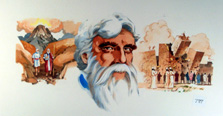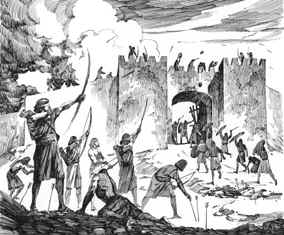The Bible: Exploring Joshua
 What’s in a name?
What’s in a name?
The book is named after its leading character, Joshua, who was appointed by God to lead Israel after the death of Moses (Numbers 27:18-23).
Joshua’s original name was Hoshea (Numbers 13:8; Deuteronomy 32:44, KJV), which means “salvation.” Moses changed this name to Joshua (Numbers 13:16). Joshua is the English form of the Hebrew name Yehoshua’, which means “Yahweh saves.” The Greek form of this name is Iesous, from which we get the English name Jesus. (Jesus was a popular name in the first century.) The title of the book in the Septuagint is Iesous Naue, which means “Joshua, [son] of Nun.”
Outline
The book of Joshua has four main sections: The early chapters describe the Israelites’ preparations to conquer Canaan, and the first steps of the invasion (1:1–5:12). The central event in this section is the Israelites’ crossing of the Jordan River (3:1-17).
 The next section details the warfare between the invading Israelites and the native Canaanites (5:13–12:24). The most important battles were against Jericho (5:13–6:27), Ai and Bethel (8:1-29), an alliance of southern cities (10:1-43) and an alliance of northern cities (11:1-15). The conquest of Canaan was a formative event in Israel’s history. Now the Israelites could describe themselves as the inhabitants of the land God had promised to their forefathers. One could now refer to Israel as a land, not just a people.
The next section details the warfare between the invading Israelites and the native Canaanites (5:13–12:24). The most important battles were against Jericho (5:13–6:27), Ai and Bethel (8:1-29), an alliance of southern cities (10:1-43) and an alliance of northern cities (11:1-15). The conquest of Canaan was a formative event in Israel’s history. Now the Israelites could describe themselves as the inhabitants of the land God had promised to their forefathers. One could now refer to Israel as a land, not just a people.
The longest section concerns the dividing of the land among the people (13:1–21:45). Even though much of the land had not yet been conquered, Joshua assigned each tribe the territory that would be its inheritance.
The book concludes with a series of postscripts (22:1–24:33). The tribes who wished to settle east of the Jordan returned to their lands (22:1-34). Like Moses, Joshua made a farewell address and gathered the people together to renew the covenant (23:1–24:27). Finally, Joshua’s death is recorded, along with an appraisal of his distinguished career (24:28-33).
How to read this book
In Lesson 1, we saw how often the Israelites rebelled against God and his chosen leaders. And in Judges, the book following Joshua, Israel’s spiritual decline and eventual collapse is described in gruesome detail. But the period of Joshua’s leadership was one of the high points in Israel’s history (24:31).
As you read this book, keep in mind one of its major themes: Joshua’s leadership.
Joshua was a young man when Moses appointed him as one of his ministers, or attendants, during the wilderness journey. Read the following passages which tell of some of his services during those years: Exodus 17:8-16; 24:12-13; Numbers 13:1-16; 14:26-35. At the close of Moses’ career, God chose Joshua to be his successor (Num 27:18), and Moses transferred the mantle of leadership to his faithful attendant and friend (Deut 34:9)….
Read what God said of Joshua in Numbers 27:18 (cf. Deut 34:9). Joshua feared God, believed God, obeyed God, and gloried God. He was a great ruler, commanding the respect of all his subjects (Deut 34:9), maintaining order and discipline, putting the worship of God central in the nation’s government. (Irving L. Jensen, Jensen’s Survey of the Old Testament, pp. 144-145)
Learning about God
The book of Joshua illustrates many important aspects of God’s role and his nature:
- God is Creator. All of creation is subject to God’s sovereign control: He blocked the waters of a river (3:14-17), shattered the walls of a city (6:20), sent hail from heaven (10:11) and lengthened the hours of a day (10:13-14) — all to accomplish his purpose.
- God is faithful. By leading Joshua and the Israelites into the Promised Land, God was fulfilling the promises he had made to Abraham (Genesis 17:1-14), Isaac (26:24) and Jacob (28:10-22). God gave each tribe a sizable inheritance (Joshua 13–21). He gave special inheritances to the Levites (21:1-42) and to Caleb (14:6-15) and Joshua (19:49-50). Nobody was left out; God’s faithfulness was complete (21:45). Even Joseph’s bones were finally laid to rest, fulfilling earlier promises (24:32; see Genesis 50:24-26 and Exodus 13:19).
- God hates sin. God waged war against the pagan Canaanites and against any who sinned in Israel.
God is constantly at war with sin because it is an affront to His holiness and because it destroys people whom He loves and desires to bless (cf. Rom. 6:23). In the book of Joshua, God waged war with sin wherever he found it…. Given more spiritual privilege, His people shouldered more spiritual responsibility. God’s love for Israel led Him to purge out the sin in the camp so that it would not destroy the whole nation. God evidently dealt with Achan as severely as He did [Joshua 7] in order to give His people a clear demonstration of His hatred for sin at the beginning of this new era in their national life. (Thomas L. Constable, “A Theology of Joshua, Judges, and Ruth,” in A Biblical Theology of the Old Testament, ed. Roy B. Zuck, p. 105)
- God is our eternal leader. Moses, the great servant of God, had died. The leadership of Israel now passed to Joshua. God reserved for himself the right to appoint the successor of Moses. Joshua was in some ways similar to his predecessor, but in other ways different. This transition challenged the faith of Israel. The Israelites rose to the challenge and accepted Joshua. They told him: “Just as we fully obeyed Moses, so we will obey you” (1:17).
It is always unsettling to have a change of leadership, and not only at the national level. Even the members of a small church congregation can become accustomed to their leader’s way of communicating. Even though the change of a leader or minister can be disorienting, like Israel we must remember that the same ultimate authority is still in charge. If God can allow for differences in styles of leadership according to the personalities of those he appoints, we should be able to adjust.
- Jesus Christ is revealed in the book of Joshua by type. “Joshua (‘Jehovah is Savior’) prefigures Christ as the Captain of our salvation (Heb 2:10-11), leading His people in the power of His Spirit. Joshua succeeded Moses, who pictures Christ as the obedient Servant (Heb 3:5)” (The New Unger’s Bible Handbook, p. 120).
Articles in “Exploring the Word of God: Historical Books”
|
Other topics
- INHERITANCE: The many passages describing the inheritances of the various tribes, when read in the light of God’s faithfulness to us, are highly encouraging (21:45). Every tribe had an inheritance (24:28). Likewise, there is a place reserved for faithful Christians in God’s kingdom (John 14:1-3).
- REST: Through Joshua, God gave that generation rest from war (11:23), but the people did not have permanent peace because of recurring sins. The theme of lasting peace was foreseen by the prophets, who looked forward to a time when nations would “beat their swords into plowshares and their spears into pruning hooks. Nation will not take up sword against nation, nor will they train for war anymore” (Isaiah 2:4; see also Micah 4:3).
- ARK of the COVENANT: The ark of the covenant or “ark of the Testimony” (Exodus 25:22) symbolized the presence of God. The ark reminded the people that it was God who enabled them to enter (3:1–4:24) and to conquer (6:1-21) the Promised Land.
What this book means for you
Although Joshua is speaking of military battles and geographic territory, we can apply the principles by which God worked there to the spiritual battles we face and the spiritual territory we have yet to possess…. In the light of Joshua Christians should ask themselves:
- How much progress am I making in my Christian life?
- What are the spiritual enemies which hinder my progress?
- How much do I obey what God’s Word teaches me in my daily life?
- Do I take God at his word and believe him, even when it would seem foolish to do so?
- At what points am I tempted to compromise my Christian faith? (John Balchin et al., The Compact Survey of the Bible, pp. 39, 41)
Your answers to these questions will show you where you stand with God. Like Joshua and the Israelites (1:16-18), you can renew your commitment to God and his Word.
In Canaan there were “seven nations greater and mightier” than Israel (Deuteronomy 7:1, NKJV) that had to be dispossessed and destroyed. But just as no nation could defeat Joshua and Israel under God, so no being in the spirit realm (Ephesians 6:12) can withstand the power of Jesus Christ, who has defeated Satan (Matthew 4:1-11) and is now at God’s “right hand in the heavenly realms, far above all rule and authority, power and dominion” (Ephesians 1:20-21).
Christians must remember that spiritual victory lies in obedience to God through the power of his resurrected Son, Jesus Christ (1 Corinthians 15:51-57; see also Isaiah 25:8).

